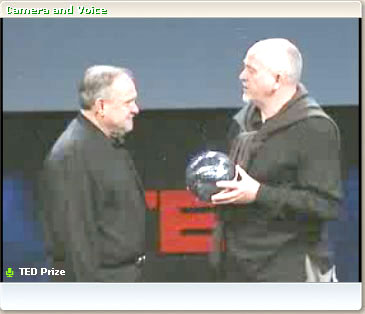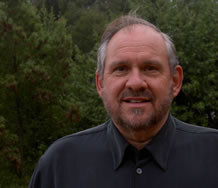TOTAL EARLY DETECTION; RAPID RESPONSE
Larry Brilliant's TED Prize Wish


Larry Brilliant (left) receiving TED Prize from Peter Gabriel
LARRY BRILLIANT'S WISH: I wish that you would help build a powerful new early warning system to protect our world from some of its worst nightmares.
[Click here for Larry Brilliant's presentation during the TED Prize session]
Plan of Execution:
• The system should be transparent, with basic information freely available to everyone, preferably in their own language, and will be independent of any single government, any single company, any single UN agency, but will offer its alerts, data, access to all
• Build out team starting from existing Canadian operation (GPHIN – the Global Public Health Information Network) which detected SARS and other epidemics and disasters in time to help the world respond and contain them
• Negotiate with Canadian Government to move operations into a new non-governmental entity (either non profit or for profit – TBD – dependent on keeping economic self sufficiency with major employment in Canada but with parallel system in another time zone and another continent)
• Create broad alliance of companies and institutions who back the idea: the new entity will be controlled by independent board of directors
• Strong indications of support from Kleiner Perkins, Sun, Omidyar Network, Google and others
• Collaboration with WHO, CDC, Health Canada, multiple universities
• Create expert advisory boards in fields of: epidemiology, natural disasters, industrial and environmental catastrophes, famine, human right; this expertise will shape which indicators to prioritize
We Are Looking For:
• A braintrust to help identify the most useful/powerful patterns of danger to look for
• Companies willing to contribute the following technologies… servers, super-computing services, hosting, telecom services, cell phones and more
• Full-time employees in the following areas: CEO or executive director, fundraising, business development, epidemiology, early detection systems
• A PR and communications partner
• Media partners
• Relationships with a wide variety of other partners in multiple countries
Questions We're Still Asking:
• Is this best done as a for-profit or non-profit?
• Apart from pandemic prevention what are the other best applications of the service? (Drought/starvation watch? Refugee crises? Human rights issues? Environmental issues?)
• What are the best ways to preserve transparency and negotiate privacy issues?
• What haven't we thought of?



